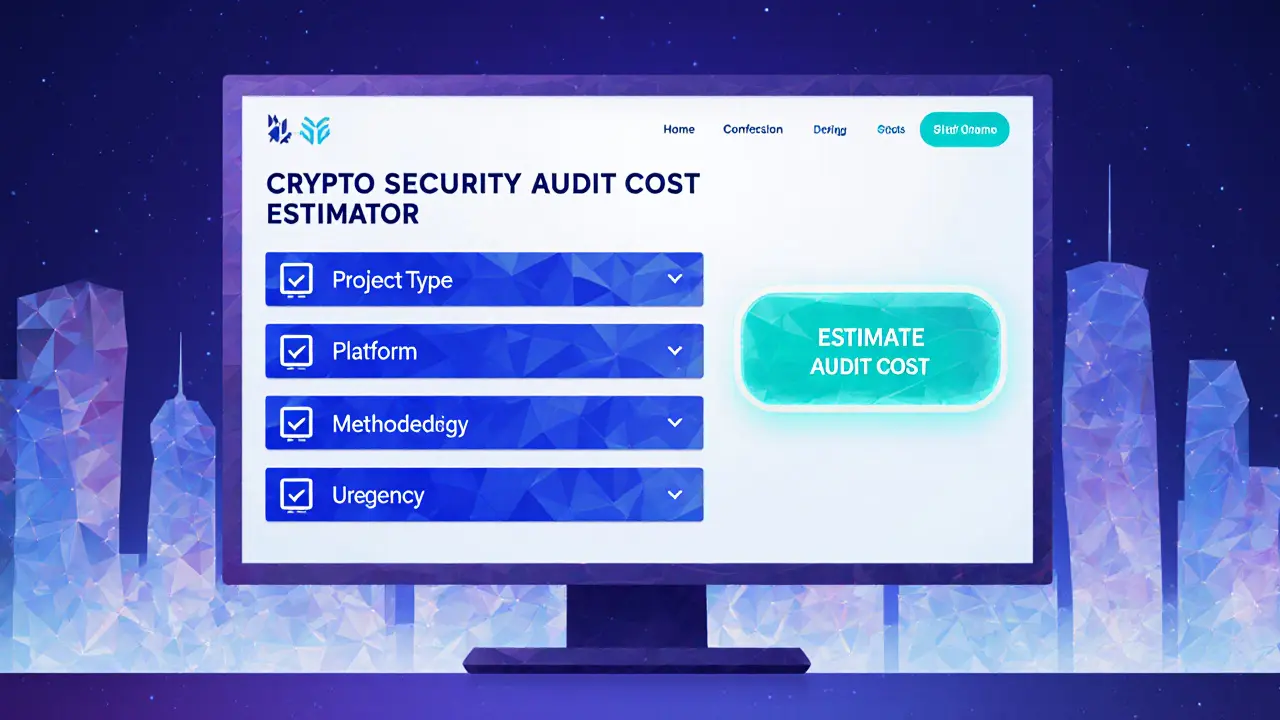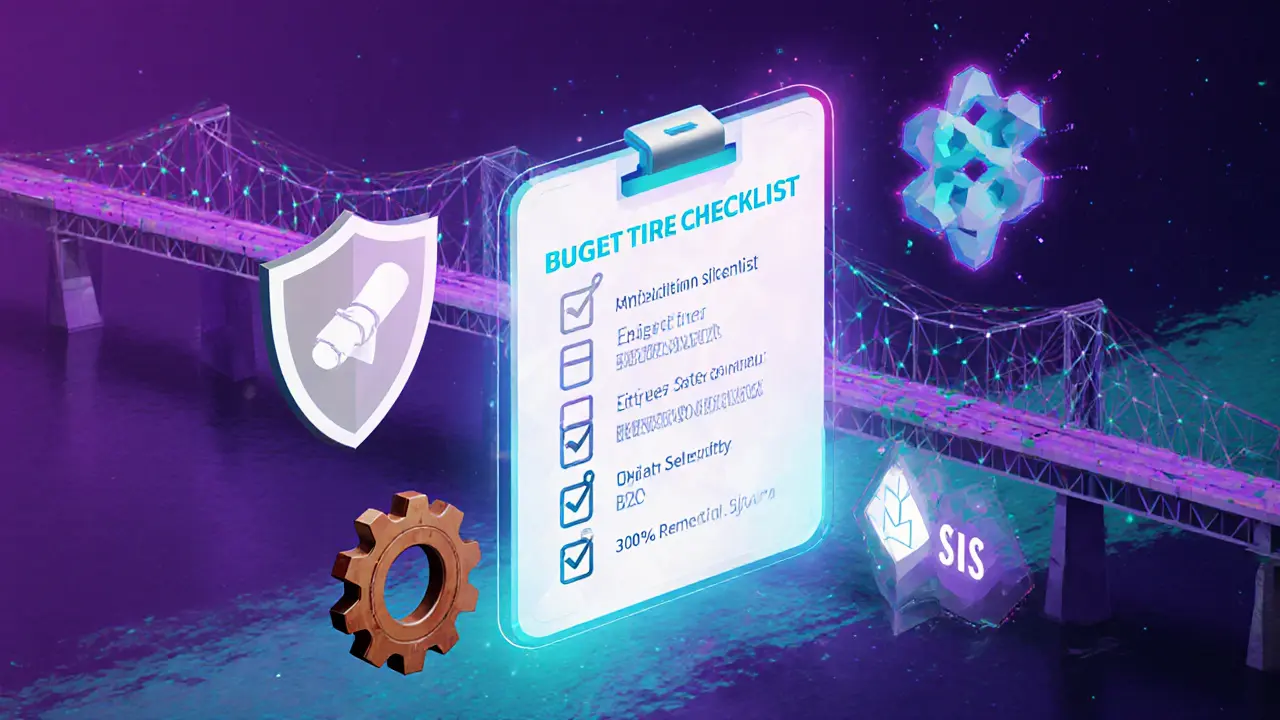Crypto Security Audit Costs in 2025: Pricing Guide by Project Type

Crypto Security Audit Cost Estimator
Estimated Audit Cost Range
Typical duration:
Breakdown
- Base Audit Fee
- Remediation & Verification
- Urgency Premium
Basic Token
ERC-20/SPL tokens with 300-800 lines of code
$1,000 - $20,000NFT/Staking
Simple NFT collections, staking contracts (1,000-3,000 lines)
$15,000 - $50,000DeFi Protocol
DEX, lending, yield farms (5,000-15,000 lines)
$40,000 - $100,000+Enterprise Multi-chain
Cross-chain bridges, DAO treasuries (15,000+ lines)
$100,000 - $300,000+When you launch a blockchain project, the biggest budget line you’ll see early on is the Professional crypto security audit is a comprehensive review of blockchain code, protocols, and associated business logic performed by specialized security firms to identify vulnerabilities before deployment. Skipping or under‑budgeting this step is a recipe for loss - exploits in 2024‑2025 have wiped out millions from projects that thought a cheap audit was enough. This guide breaks down what you’ll actually pay in 2025, why prices vary so much, and how to plan a realistic security budget.
TL;DR
- Basic token audits: $1,000 - $20,000
- Mid‑level dApps (NFTs, staking, governance): $15,000 - $50,000
- DeFi protocols: $40,000 - $100,000+
- Enterprise‑grade multi‑chain projects: $100,000 - $300,000+
- Add 20‑30% extra for remediation cycles and expedited timelines
1. Pricing Tiers by Project Complexity
Audit firms categorize projects into three broad tiers. The numbers below reflect the average quoted range in 2025 across top providers such as ConsenSys Diligence, Trail of Bits, OpenZeppelin, and niche players like Zealynx.io.
| Project Type | Typical Lines of Code | Audit Cost (USD) | Typical Duration |
|---|---|---|---|
| Basic ERC‑20 / SPL token | 300‑800 | $1,000 - $20,000 | 2‑4 weeks |
| NFT collection, simple staking | 1,000‑3,000 | $15,000 - $50,000 | 4‑8 weeks |
| DeFi protocol (DEX, lending, yield farm) | 5,000‑15,000 | $40,000 - $100,000+ | 6‑12 weeks |
| Enterprise multi‑chain app, cross‑chain bridge, DAO treasury | 15,000‑40,000+ | $100,000 - $300,000+ | 8‑16 weeks |
2. What Drives the Price? Core Cost Factors
Understanding the drivers helps you negotiate and avoid hidden fees.
- Code size & complexity: Auditors bill by the line and by the logical paths they need to trace. A simple token with a single ERC‑20 contract takes minutes; a DeFi protocol with multiple pools, flash‑loan logic, and governance modules can require weeks of manual review.
- Platform choice: Ethereum (Solidity) audits are cheaper because there’s a deep pool of auditors. Solana (Rust) audits command a premium due to scarce expertise.
- Methodology: Automated static analysis only ≈ 30‑40% of a full audit. Firms that add manual line‑by‑line review, business‑logic verification, and attack‑surface testing charge 2‑3× more.
- Reputation & track record: Top‑tier firms (Trail of Bits, ConsenSys Diligence, OpenZeppelin) price 30‑50% above market averages because their reports have a higher success rate in preventing exploits.
- Timeline urgency: Expedited audits (under 4 weeks) usually add 25‑50% to the base price.
- Remediation cycles: Most projects need at least one round of fixes and a verification audit. Firms often quote the “starting from” price+remediation as a separate line item.
3. Budgeting Beyond the Quote: Remediation & Ongoing Checks
Industry experts advise setting aside an extra 20‑30% of the headline cost. Here’s why:
- Vulnerabilities discovered during the audit typically require code changes that take developers additional time.
- After fixes, auditors run a second verification scan, which is billed separately (often 30‑40% of the original fee).
- Expedited remediation (e.g., “critical fix within 48hours”) can trigger a surcharge.
Example: A $50,000 DeFi audit may end up costing $65,000-$70,000 once remediation and a final verification are factored in.

4. Picking the Right Auditor - Not Just the Cheapest
When you compare firms, treat the decision like hiring a surgeon. Look for:
- Publicly verifiable audit reports (many firms publish redacted case studies).
- Experience with similar protocols - a firm that audited a lending platform is better suited for your loan‑logic than one that only does token audits.
- Post‑audit support - does the contract include a limited‑time “remediation window”?
- Independent reputation - check community forums (Reddit r/ethereum, Twitter threads). Projects that spent $5,000 on a cheap audit but still got exploited often cite the firm’s lack of manual review.
Top‑tier audit firms typically charge $100‑$150 per hour for senior security engineers. Mid‑tier firms range $60‑$90 per hour. Independent researchers may be $30‑$50 per hour but often lack the formal reporting structure.
5. Real‑World Cost Snapshots (2025)
Below are anonymized numbers from recent engagements shared publicly by developers.
- Project A: Simple ERC‑20 launch on Ethereum - $8,000 audit + $2,000 remediation = $10,000 total.
- Project B: NFT drop with royalty logic on Solana - $22,000 audit (Rust expertise) + $7,000 remediation = $29,000.
- Project C: Decentralized exchange on Polygon - $85,000 full audit, two remediation rounds, final verification = $110,000.
- Project D: Cross‑chain bridge linking Ethereum, Binance Smart Chain, and Polkadot - $250,000 enterprise audit, plus $60,000 for post‑audit monitoring for 12 months.
These figures illustrate why many teams allocate 5‑15% of total development budget to security.
6. Preparing Your Code to Lower the Bill
Auditors spend a lot of time just understanding the code base. Good prep can shave weeks and thousands of dollars.
- Write clear documentation: Inline comments, architecture diagrams, and a concise README reduce the “context gathering” phase.
- Adhere to standards: Follow OpenZeppelin’s security guidelines and ConsenSys best‑practice checklists. Projects that deviate often incur extra manual review time.
- Run automated linters: Tools like Slither (Solidity) or cargo‑audit (Rust) catch low‑ hanging bugs before the audit.
- Provide test coverage: Unit tests, integration tests, and fuzzing scripts give auditors a baseline for expected behavior.
- Define threat model upfront: Tell the auditor what assets are at risk, expected transaction volume, and any off‑chain dependencies.
Projects that bundle these assets into a “pre‑audit package” report average 15% lower final costs.
7. Ongoing Security After the First Audit
Security isn’t a one‑off event.
- Post‑audit monitoring: Some firms offer on‑chain monitoring services that alert you if new vulnerabilities are discovered in the dependencies you use.
- Version upgrades: When you upgrade Solidity or Rust compiler versions, you typically need a light re‑audit (10‑20% of original price).
- Periodic re‑audits: For high‑value DeFi protocols, a quarterly audit is becoming a standard compliance requirement.
8. Quick Decision Checklist
Use this checklist when you’re ready to request a quote.
- Identify project tier (basic token, mid‑level dApp, DeFi, enterprise).
- Calculate expected lines of code and platform (Ethereum vs Solana).
- Determine required methodology (automated only vs full manual).
- Set a timeline - add 20% if you need it in under 4 weeks.
- Allocate 30% extra budget for remediation and verification.
- Gather documentation, threat model, and test suite before contacting auditors.

Frequently Asked Questions
How much does a basic token audit usually cost?
For a standard ERC‑20 or SPL token with under 1,000 lines of code, expect $1,000‑$20,000 depending on the auditor’s reputation and whether you need a manual review.
Why are Solana audits more expensive than Ethereum audits?
Solana contracts are written in Rust, and there are fewer security experts proficient in that stack. Limited supply drives higher hourly rates and longer manual review times, pushing prices 20‑40% above comparable Solidity audits.
Do audit firms include remediation in their initial quote?
Most firms quote a “starting from” price that covers the initial code review only. Remediation support, re‑audit, and any additional testing are billed separately, often as 30‑40% of the original fee.
What’s the typical timeline for a DeFi protocol audit?
A full‑scale DeFi audit usually takes 6‑12 weeks, including the initial review, developer remediation, and final verification. Complex cross‑chain projects can stretch to 16 weeks.
Can I afford a cheaper automated audit and skip manual review?
Automated tools catch low‑level bugs but miss business‑logic flaws, re‑entrancy patterns, and economic attacks. For high‑value DeFi projects, a cheap scan is a false sense of safety; most breaches occur in areas only manual reviewers spot.
How should I budget audit costs relative to my total development spend?
A common rule of thumb is 5‑10% of total development budget for basic projects and up to 15% for DeFi or enterprise protocols. This ensures you have enough margin for remediation and potential follow‑up audits.
Is it worth getting multiple independent audits?
Yes, especially for large DeFi platforms handling millions in TVL. Independent audits provide a second set of eyes, reducing the probability of a missed vulnerability. The extra cost (often 20‑30% of the first audit) is usually dwarfed by potential loss from an exploit.

Kate Roberge
December 16, 2024 AT 10:18Honestly, most people think slapping a $5k price tag on a token audit guarantees safety, but that's pure wishful thinking. The guide just rehashes the same buzz‑words without digging into why a manual review can cost three times more. If you’re actually trying to protect $10M in TVL, you should be demanding a breach‑response clause, not just a “remediation window” line item.
Jason Brittin
December 24, 2024 AT 02:03Nice breakdown! 🙃 It’s cool to finally see numbers that actually make sense instead of vague “$XX‑$YY” placeholders. If you’re on a deadline, just remember the urgency premium isn’t a punishment, it’s the market’s way of saying you’re paying for someone’s overtime. Good luck navigating those extra 30% when the crypto winter hits!
VICKIE MALBRUE
December 31, 2024 AT 17:49Great guide hope it helps launch safely
april harper
January 8, 2025 AT 09:35We stand at the precipice of decentralised destiny, yet the price of security feels like a Sisyphean toll. Auditors become modern alchemists, transmuting code into trust, but the gold they demand grows with every line of logic. In this cryptic theatre, the audience pays not just for performance but for the fear that the show might end in flames.
Waynne Kilian
January 16, 2025 AT 01:21i totally get u april – it's like i read a poem about contracts 😂 but real life costs real cash so we gotta be real about budgets lol
Carl Robertson
January 23, 2025 AT 17:06The numbers are fine, but the real drama is how many projects ignore the “remediation round” and end up gas‑lighting their investors. This guide pretends to be neutral while silently endorsing firms that charge $300k for a bridge audit, which is basically a black‑mail racket in a fancy wrapper.
Rajini N
January 31, 2025 AT 08:52If you’re preparing for a DeFi audit, start by assembling a concise threat model that lists assets, typical transaction flows, and any off‑chain dependencies. Provide the auditor with a full test suite and coverage report; this alone can shave a week off the schedule and reduce the manual review hours by roughly 15 %. Also, remember to lock in a remediation window in the contract to avoid surprise billable hours later.
Oreoluwa Towoju
February 8, 2025 AT 00:38Stick to the checklist and you’ll keep the audit cost under control.
Amie Wilensky
February 15, 2025 AT 16:24Wow-what a comprehensive guide!!!; however-there's something missing: a realistic discussion about how audit firms sometimes cherry‑pick vulnerabilities!!!; you see, the industry loves a good PR story, not a raw list of flaws!!!; but fear not-this article does a decent job highlighting cost factors!!!; still-consider adding a section on post‑audit monitoring!!!
MD Razu
February 23, 2025 AT 08:10When you contemplate the price of a crypto audit, you are really staring at the value of trust in a trustless world.
The numbers on the page are not merely fees; they are a quantification of the collective anxiety that permeates the blockchain ecosystem.
Every line of Solidity or Rust is a potential doorway for an attacker, and auditors are the custodians of those doors.
Thus, the $40,000‑$100,000 range for a DeFi protocol reflects not just labor, but the scarcity of true expertise in this niche.
In a market where half of the talent pool drifts between hobbyist forums and full‑time research labs, supply and demand inevitably drive prices upward.
Moreover, the urgency premium is a hidden reminder that time, unlike code, cannot be refactored after the fact.
If a project rushes an audit, the firm must allocate senior engineers on weekends, and that cost inevitably bubbles up to the client.
The remediation phase, often glossed over, is where most of the real work happens, because fixing a subtle re‑entrancy bug can require a complete redesign of the state machine.
Auditors typically charge 30‑40 % of the original fee for this verification, which is a sensible safeguard against half‑implemented patches.
Consider also the ongoing monitoring services that some firms offer; they act as an early warning system for newly discovered vulnerabilities in third‑party libraries.
These services, while optional, can be the difference between a minor patch and a catastrophic loss of millions.
From a strategic standpoint, budgeting 5‑10 % of total development capital for security is a rule of thumb that has stood the test of several high‑profile exploits.
Projects that ignored this advice often found themselves on the news, their tokens slumped, and their communities fractured.
On the other hand, those that invested prudently in thorough audits and post‑audit monitoring enjoyed smoother rollouts and greater investor confidence.
Therefore, when you read a guide that outlines audit costs, interpret it not as a price list, but as a roadmap to safeguarding value.
In the end, the true cost of security is measured not in dollars, but in the preservation of trust that underpins every decentralized application.
Lindsay Miller
March 2, 2025 AT 23:55I hear you – figuring out audit budgets can feel overwhelming, but remember that a solid security review protects your users and your reputation.
Michael Wilkinson
March 10, 2025 AT 15:41Stop underestimating the audit; cheap shortcuts are a recipe for disaster.
Kate Nicholls
March 18, 2025 AT 07:27The guide does a decent job summarizing cost tiers, but it could benefit from more real‑world case studies to illustrate hidden fees.
Charles Banks Jr.
March 25, 2025 AT 23:13Oh great, another checklist. Because what the crypto world needed was more paperwork, right? Still, if you follow it, at least you won’t get fined by the auditors for missing a line.
Naomi Snelling
April 2, 2025 AT 15:58I’m pretty sure the big audit firms are in cahoots with the exchanges to keep us dependent on their overpriced services; the numbers look more like a profit scheme than a fair market rate.
Katrinka Scribner
April 10, 2025 AT 07:44lol, this guide is sooo helpful 😭 but also kinda scary when you think about all that $$$… hope u all budget wisely!